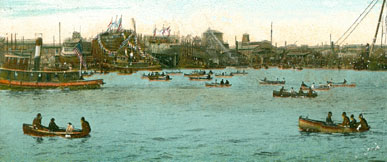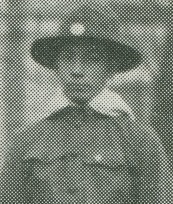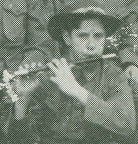
|
Keep Sweet! |
|
A Memoir by the Late Dr. Roy Sheppard Minerd - Part 4 of 12 |
Last month: More of the boys begin to reach out to their new mentor, Roy S. Minerd, even as he is tending to their own great pains and griefs. We are introduced to Eddy O., Chas V. and Willie B. Always the educator, Roy also teaches them the popular son, Keep Sweet!, which soon is "on the lips of everyone and ... heard in every corner."
I have mentioned their learning "Keep Sweet." While at home I found a small celluloid button which had been given me by the composer of the song and bearing the words "Keep Sweet." I gave it to Mr. B. with directions to give it to the first boy who needed it. He was to wear it till he saw someone else who needed to be reminded to "Keep Sweet," when he was to pin it onto his coat. I told the boys the significance of it and they entered right into it. The first week Mr. B. wore it the whole week, but the second week 26 had it! Most of them took it good naturedly and laughed off their ill humor, watching eagerly for a chance to get rid of it.
During the late summer Miss S. went to Maine for a short vacation. While she was absent, one of the Home's problems had a little difficulty with the caretakers on account of disobedience and planned with two younger boys to run away. They slipped down the fire escape at 3 a.m., climbed the fence and made for the river front, arriving about breakfast time.

|
|
The Philadelphia waterfront of the 1910s |
After eating (they brought their meal), they went to the city line and built a little shack for protection. By evening the two younger chaps declared their intention of returning to the Home, much to the disgust of E.P. [Ellis Pedrick] who, as leader of the enterprise, put up a stiff fight. They persisted and he refused to stay alone, so about 6:30 p.m. three very much humiliated chaps slipped around to the door and asked for admittance. The matter was mentioned to me the next Sunday, and I had a talk with E.P. The other two boys are considered by some to be just a little feeble minded and both had a reputation for running away when they came to the Home from another institution. They were trying to break the habit and E.P. helped upset what they had accomplished.
|
|
|
Ellis Pedrick --
who had an |
A few words about E.P. are necessary here. He has an abominable disposition and except for an aunt and a grandmother has no people, save a worthless father who, as E.P. truthfully says, doesn't care what becomes of him. They have been having trouble with him for some time past, and E.P. has the idea that everyone is down on him and that he is picked out as the one to be punished for everything that goes wrong. His whole attitude is "Nobody cares what happens to me, so what's the use of trying?"
The Sunday following his running away I was told of it and later in the day slipped off with him to a seat in the yard some distance from the others and questioned him. I knew he was only 12 years old, but he told me he was five feet four and weighed 123 lbs, and wears a number eight shoe! I was astonished, but the information enabled me to make a speedy diagnosis of his disposition. I explained briefly the physical, especially nervous strain attendant on adolescence and the unusual strain of such unusual development at that age. I showed him how such a condition kept him tired out and feeling upset all the time, which naturally resulted in his being irritable, especially when crossed in any way. I told him all his symptoms -- did not ask -- and he acknowledged to every one, which helped him to have more confidence in what I was telling him.
When I had finished he saw that instead of everybody's being against him, the real trouble was with himself. We talked for something short of an hour and I left him in a very sober mood. After luncheon as I passed him in the hall he squared himself in front of me, placed a hand on each of my shoulders, and as seriously as I have every seen him, said: "Mr. M., I want to thank you for what you told me this afternoon; I know it will help me a lot." And it has. Rome wasn't built in a day, and the habits formed and so easily followed are hard to break. But he is improving and succeeding, tho’ slowly.
While we were talking in the afternoon, someone spied K. slipping over the fence and raised the cry "Boy running off;" which causes as much excitement as "Man overboard" does to passengers and sailors. Several started in pursuit, among them Christie M., one of the older and more reliable boys. The superintendent was in Maine, and the responsibility rested upon Mrs. B., whose confidence in Christie was such that she said to me, "He'll come back all right. Christie's gone after him and he won't come back without him."
And sure enough! The other boys who started the chase came in one by one and finally in came Christie tired, over heated, but with K. by his side. Such a difference in people's attitude toward things. Christie will succeed in life.
| 'I told him all his symptoms -- did not ask -- and he acknowledged to every one, which helped him to have more confidence in what I was telling him. When I had finished he saw that instead of everybody's being against him, the real trouble was with himself.' |
Meantime Sunday School work was progressing finely, and the boys were becoming very much interested in the lessons as well as the technical bible study work we were doing. Once or twice a boy or two would become a little restless. I would immediately on the "q.t." tell him that I wanted him to do police duty and keep the boys in order. Usually he was the only one who needed to be kept in order, so he was still and everybody was happy.
During the Summer months, those who regularly took Chapel Sunday morning were away from the city. Miss S. asked me to look after the chapel services which I very gladly did. The remainder of the day we spent in various ways, ending up with our Sunday Evening gathering.
Sunday, July 30th, I spoke in Chapel on the first half of the 23rd Psalm. After Chapel, several of the boys (Gardner, Dawson and Minton), after collecting the song books asked me if they might sing a little. Very gladly I reopened the piano and three good clear voices sang the old songs of the church, two of them carrying very well the soprano and the other who reads music, balancing theirs with his also.
Seeing an opportunity when they asked for "Just As I Am Without One Plea," I spoke of the words, and explained their meaning. I said no more after singing it thru, leaving them to think it out for themselves, and three very thoughtful boys accompanied me downstairs as the dinner bell rang.
Finishing the Psalm the next Sunday, I spoke of the joys and beauties as well as the helpfulness of the Christian's life and urged the children all to try harder to do as Jesus would have them do and to read more of His word.
|
|
|
Gardner (left), Minton (center) and Dawson |
After the service Dawson asked me for some references. He said "I don't know where to turn to find what I need. Every time I open the bible I am sure to see 'Someone begat so-and-so and he begat Someone-else and I'm not interested in that." Naturally not!
As a result, he gathered together about 15 boys whom he thought to be interested, and we got bibles and read together the first chapter of James, which, with explanations and discussions, and questionings took us over an hours. The boys were delighted and on the spot asked for more such hours. Dawson then asked for some help in Bible Geography.
"I get all mixed up when I read of this city and that country and don't know where they are."
We took a period for that and I loaned him a bible in which were a number of splendid maps. Comparison of those maps with the maps in an up-to-date geography cleared things up finely for Jim.
August 13th. I talked on the Lord's Prayer. Afterwards we sang as he had the previous two Sundays and again used "Just As I Am." I went a little further than on either of the other Sundays, but still bided by time. The boys were arriving where I wanted them. The following Saturday (Aug. 19) I went to Chestnut Hill with the Scouts on a hike. Returning I sat with Dawson on the trolley. He told me he had been reading Matthew and had picked out a number of verses that meant more than others to him and some places he didn't understand and wanted to talk over with me. They were very fine, and when I looked them up I found I had marked the larger number of them for myself before.
| 'There in the old chapel, rich in the memories of over half a century, echoing the voices of seven thousand children raised in song and praise within its walls during those years -- there, with the rays of the setting sun streaming with soft light thru its colored windows, those four dear fellows opened their hearts at the knock of the Master and He did "come in and supped with them and they with Him."' |
The following day, Sunday, my subject was "Christianity: What and Why?" In this talk I endeavored to explain as simply as possible what it means, and why we should accept it. At the close I said I'd be very glad to talk further with anyone who was interested, and had four responses. In the afternoon we went to Chapel and there talked over those things which mean so much for help and strength and joy of living. There in the old chapel, rich in the memories of over half a century, echoing the voices of seven thousand children raised in song and praise within its walls during those years -- there, with the rays of the setting sun streaming with soft light thru its colored windows, those four deal fellows opened their hearts at the knock of the Master and He did "come in and supped with them and they with Him."
It was touching to see those fellows as they realized what it all meant and that it was for them that he suffered and died -- for them, motherless, and fatherless, dependent, friendless, -- to see them, I say, with tears streaming down their manly faces, look up and say, "Yes, I believe that I am forgiven for my past and that He saves me now, because I am willing to take Him into my life."
That week they all got busy. They tried first of all to live their new profession, and then, when occasion permitted, spoke to certain other boys whom they thought they might influence to do as they had done. As a result, before chapel the following Sunday, several boys asked me if they "could come up" that afternoon. My talk was, "Christianity: How?" and six more responded at the close of the meeting, and we had a repetition of the experiences of the preceding Sunday. Two of the boys were younger than those of the preceding group, but one of the others was E.P.
A number of these boys, too, were very much broken up as we closed the talk with a short prayer for their welfare, altho an effort was made not to appeal to the emotions, but to the common sense of the chaps. This afternoon, as on the preceding Sunday, we spoke of the strength from united prayer and each promised to pray for each of the others, by name, once a day at least. At first thought this does not mean much, but when one realizes as he thinks over the day's experiences, that sometime during its busy moments, and perhaps at that moment, all those boys are sending up or have sent up petitions on his own behalf, it is a wonderful inspiration and a check as well.
In Part 5 next month: More of the orphans at the Northern Home in Philadelphia begin to realize that their unhappiness is due to their own poor attitudes. Their mentor, Roy S. Minerd, spends personal time with some of the more difficult boys, and leads them deeper into the teachings of the Bible. Soon, several of them agree to commit their lives to Christ.
Copyright © 2001 Mark A. Miner



